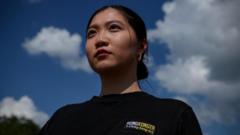Police in Hong Kong have arrested the father and brother of Anna Kwok, a pro-democracy activist currently based in the United States, on allegations of providing financial assistance to her in violation of the territory's national security laws. These arrests represent a notable application of the security legislation, targeting family members of individuals deemed "absconders."
Kwok, 26, has been accused of participating in pro-democracy protests in 2019, leading to her departure from Hong Kong in 2020. She presently serves as the Executive Director of the Hong Kong Democracy Council (HKDC), an organization located in Washington D.C. The arrests involve her father, 68, and brother, 35, who have been accused of handling funds or assets belonging to her.
According to reports from local media, police initiated their investigation after observing instances of the two men's meetings with Anna Kwok overseas. The father, Kwok Yin-sang, is specifically charged with attempting to access his daughter’s life and personal accident insurance policy to procure funds on her behalf. He has been denied bail by a national security judge, while his son has reportedly been released on bail as inquiries continue.
Under the stringent Safeguarding National Security Bill, actions that financially assist an absconder are categorized as illegal. In recent developments, the Hong Kong government outlined bounties on several pro-democracy figures, including Kwok, leading to accusations of collusion with foreign entities—charges that can carry severe penalties including life imprisonment.
Anna Kwok has previously characterized the issuing of bounties against her and her colleagues as a deliberate strategy to intimidate and silence dissent. She stated that such tactics are consistent with the tactics of the Hong Kong administration and the Chinese Communist Party.
Hong Kong, which reverted to Chinese sovereignty in 1997, still retains certain freedoms that are diminishing and increasingly scrutinized. As the situation develops, the impact of these arrests on familial ties and the broader pro-democracy movement in the region remains a critical point of concern.



















